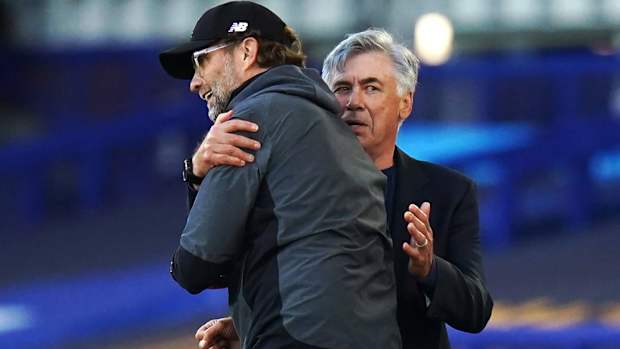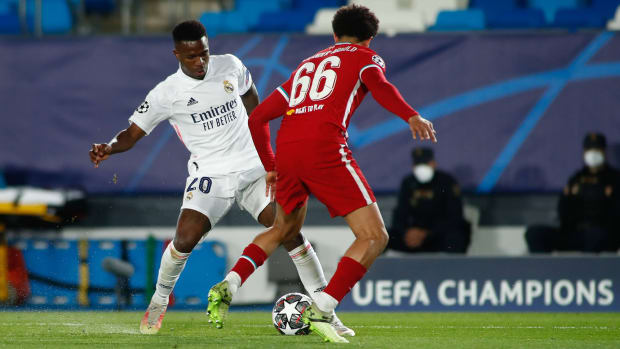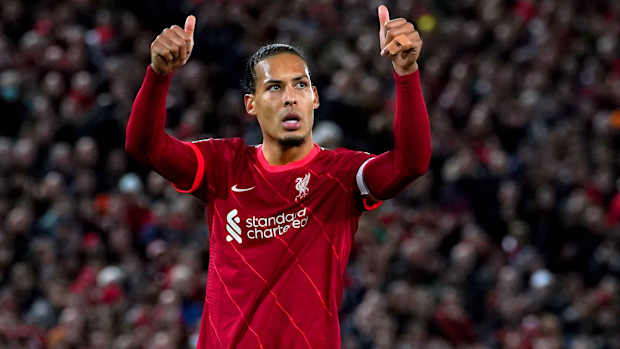It’s Liverpool’s press and ability to control against Real Madrid’s penchant for capitalizing on chaos and brilliant moments. So which one will prove superior in Paris?
Real Madrid’s progression to the 2022 UEFA Champions League final has largely defied explanation. Three times it has been outplayed and has seemed to be on its way out, and three times it has found sudden, unexpected late goals to win: three after the 61st minute against Paris Saint-Germain, two after the 80th minute against Chelsea, and three after the 90th minute against Manchester City.
Tactical explanations feel inadequate. What has happened has been partly luck, partly self-belief and partly individual brilliance. On a systemic level, Madrid has been second-best in each match. It has lost the broader game of strategy but won the battles. In the longer term, that feels unsustainable. You can’t keep relying on Luka Modrić to produce a pass of the mesmerizing brilliance that brought the equalizer against Chelsea. You can’t assume that Karim Benzema will always gobble up every half-chance. And you can’t expect Thibaut Courtois to save everything once the surge has begun.
And yet at every stage, after every round, this has felt unsustainable. Nevertheless, here we are. It’s hard to imagine how Madrid could dominate Liverpool. But could it produce enough moments of individual brilliance to win a one-off game? Of course it could.

Jon Super/NMC Pool/PA Images/Imago Images
Benzema aside, Madrid’s most effective attacking has come through Vinícius Júnior pulling wide and hitting the space behind the opposing right back or right wingback. He tormented Chelsea in that area in the first half of the first leg, but also menaced Paris Saint-Germain there in the second leg and scored from that position in the first leg against Manchester City.
Liverpool will be all too aware of that threat. Last season, it was a ball from Toni Kroos for Vinícius, hitting the space behind the defensive line, that brought the opening goal as Real Madrid beat Liverpool 3-1 in the first leg of the quarterfinals. A Kroos pass from deep also led to the second, scored by Marco Asensio, as the ball bounced across the box off Trent Alexander-Arnold. There may be a sense of foreboding: How can Liverpool prevent its right flank from being exposed? After all, it’s hardly the most startling suggestion that Alexander-Arnold might not be the best defensive fullback.
But then, he’s not supposed to be a defensive fullback. He is a supreme crosser of the ball, registering 12 assists in the league this season. His linkup with Mohamed Salah is a key reason for the Egyptian’s effectiveness. To suggest that he ought to temper his attacking inclinations is to ignore his importance to Liverpool’s attacking rhythms. There will always be space behind him; the way Liverpool protects against that is through its press, preventing opponents from having time to measure passes into the space behind the defensive line.

Oscar J. Barroso/ZUMA Wire/Imago Images
Watch the Champions League final online with fuboTV: Start with a 7-day free trial!
Last season it was unusually exposed in that regard because of the plague of injuries that hit its central defense, which had a knock-on impact in midfield. The press did not function with anything like the same efficiency or aggression, which is why Kroos had time to judge his passes. Liverpool this season has recovered its snap.
That is not to say the high defensive line is not a risk. It is, and Wolves frequently threatened to expose it on Sunday in their Premier League season finale. Part of Liverpool’s shakiness last season then, though, was surely down to the absence of Virgil van Dijk. He is the leader of the press and the player who usually judges when and how far Liverpool should step up; the margins are fine and without van Dijk things can easily go awry. He was substituted after 90 minutes of the FA Cup final with a hamstring strain but should be fit to start in Paris.
The injury update on Thiago Alcântara is also encouraging for Liverpool, as he has taken part in training despite being forced off at halftime of the game against Wolves. He offers a measure of control to go with the fury of the Liverpool press, and given how Madrid has prospered in the past three rounds by breaking the structures of the game, his passing ability could be vital.

Peter Byrne/PA Images/Imago Images
But so too could the press. There has been a growing suspicion for a couple of seasons that the Premier League has physically outstripped other major leagues. Madrid was overwhelmed physically by Manchester City the season before last and struggled at times against both City and Chelsea this season. It’s fair to assume there will be periods when Liverpool can impose itself as well. What is vital, and what PSG, Chelsea and City failed to do to a decisive extent, is to take advantage of those periods.
There may also be times when Madrid is able to wriggle free, to turn the game into a shootout in which its brilliant individuals can make a decisive difference. That is where Madrid’s three previous opponents have faltered, but a Liverpool side whose style is still derived of Jürgen Klopp’s original heavy-metal template should be better equipped than them to handle the chaos.
More Soccer Coverage:
- Wilson: UCL Final Brings Elixir for Liverpool, Real Madrid’s Fresh Setbacks
- Wilson: Ancelotti’s Unique Form of Greatness Fits This Real Madrid Group
- Kylian Mbappé Stays at PSG, Snubs Real Madrid
- Gastelum: Lyon Reaffirms Its Place Atop the Women’s Soccer Hierarchy
Sports Illustrated may receive compensation for some links to products and services on this website.